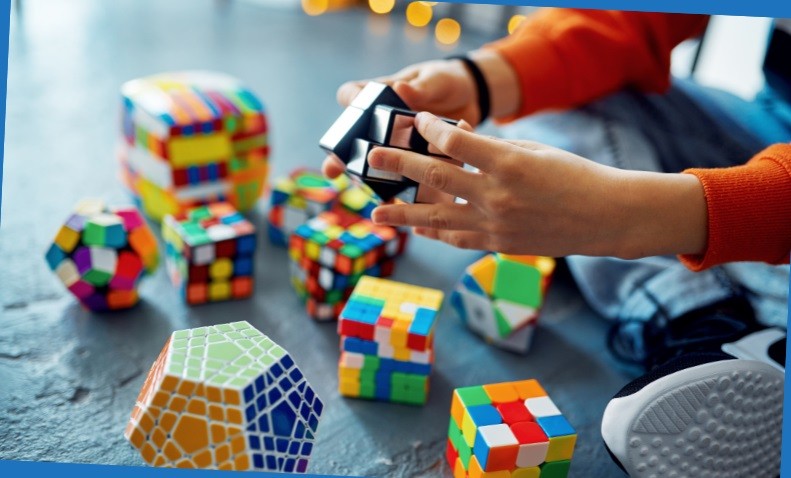Puzzle games enhance cognitive skills and improve problem-solving abilities. They also reduce stress and foster creativity.
Puzzle games are a fantastic way to boost mental agility and keep the brain sharp. These games challenge the mind, requiring players to think critically and strategically. They offer a fun yet effective method to enhance memory, concentration, and attention to detail.
Engaging in puzzle activities can reduce stress levels by providing a relaxing and enjoyable pastime. Additionally, they encourage creativity and out-of-the-box thinking, which can be beneficial in everyday life. Puzzle games are suitable for all ages, making them a versatile and inclusive form of entertainment. Whether solving a jigsaw, crossword, or Sudoku, these games provide numerous cognitive and emotional benefits.
Benefits Of Puzzle Games For Child Development
Puzzle games are more than just a fun activity for kids. They offer numerous benefits that aid in child development. From cognitive growth to emotional well-being, puzzle games can shape a child’s future. Here, we explore 12 benefits of puzzle games for child development.
Cognitive Benefits
Puzzle games help to enhance cognitive skills in children. They stimulate thinking and improve problem-solving abilities.
- Memory Improvement: Remembering shapes, colors, and pieces improves memory.
- Critical Thinking: Kids learn to think critically and make decisions.
- Visual-Spatial Reasoning: Arranging pieces boosts spatial awareness.
These benefits help children perform better in school. They also make everyday tasks easier to manage.
Emotional Benefits
Puzzles can help children manage emotions better. They learn patience and persistence through repetitive trials.
- Patience: Completing a puzzle requires time and effort.
- Stress Relief: Focusing on puzzles can be calming.
- Sense of Achievement: Completing a puzzle gives a sense of accomplishment.
These emotional benefits are crucial for mental well-being and self-regulation.
Enhance Fine Motor Skills
Handling small puzzle pieces helps develop fine motor skills. This is vital for tasks such as writing and buttoning clothes.
- Hand-Eye Coordination: Matching pieces improves coordination.
- Dexterity: Moving pieces around enhances finger strength.
Fine motor skills are essential for many daily activities and overall development.
Social And Cooperative Benefits
Puzzle games can be a social activity, fostering teamwork and cooperation.
- Teamwork: Working together to complete a puzzle teaches teamwork.
- Communication: Kids communicate to solve puzzles together.
These skills are crucial for social interactions and building relationships.
Improve Language And Communication Skills
Puzzles often come with themes and stories, enhancing language skills.
- Vocabulary: Learning new words related to puzzle themes.
- Storytelling: Creating stories around puzzle pieces.
Language skills are essential for effective communication and learning.
Logical Thinking And Math Skills
Puzzle games teach logical thinking and basic math skills. Kids learn to recognize patterns and sequences.
- Pattern Recognition: Identifying patterns improves logical thinking.
- Basic Math: Counting pieces and shapes enhances math skills.
These skills are foundational for academic success in subjects like math and science.
Boost Self-esteem And Confidence
Completing a puzzle boosts a child’s self-esteem and confidence.
- Achievement: Successfully solving a puzzle builds confidence.
- Independence: Working alone on puzzles fosters independence.
High self-esteem and confidence are important for personal growth and success.
Creativity And Imagination
Puzzles can spark creativity and imagination in children.
- Creative Thinking: Finding unique solutions to puzzles.
- Imagination: Imagining scenarios and stories with puzzle pieces.
Creativity and imagination are vital for problem-solving and innovation.
Long-term Developmental Impact
Puzzle games contribute to long-term developmental benefits.
- Life Skills: Skills learned from puzzles apply to real-life situations.
- Academic Success: Enhanced cognitive and emotional skills aid in academic achievement.
These long-term benefits are essential for overall development and future success.
Improve Concentration
Working on puzzles improves a child’s ability to concentrate.
- Focus: Staying engaged with a puzzle enhances focus.
- Attention to Detail: Noticing small details is crucial for solving puzzles.
Improved concentration helps in academic and personal tasks.
Relieve Tension
Puzzle games can help children relieve tension and stress.
- Relaxation: Focusing on puzzles can be soothing.
- Emotional Balance: Managing frustration and staying calm.
Relieving tension is important for emotional well-being and mental health.
Practice Colour Recognition
Puzzles often involve matching and recognizing colors, aiding in color recognition.
- Color Matching: Identifying and matching colors.
- Visual Discrimination: Differentiating between similar colors.
Color recognition is essential for learning and everyday activities.
Frequently Asked Questions
What Are The Cognitive Benefits Of Puzzle Games?
Puzzle games enhance memory, problem-solving skills, and cognitive functions. They stimulate brain activity and improve mental agility.
Do Puzzle Games Reduce Stress Levels?
Yes, playing puzzle games can reduce stress. They provide a relaxing activity, diverting the mind from daily worries.
Can Puzzle Games Improve Concentration?
Absolutely, puzzle games require focus and attention. Regularly playing them can significantly boost your concentration levels over time.
Are Puzzle Games Suitable For All Ages?
Indeed, puzzle games are designed for all age groups. They offer various levels of difficulty to suit different age ranges.
How Do Puzzle Games Boost Creativity?
Puzzle games encourage creative thinking. They require players to think outside the box, fostering innovative problem-solving skills.
Key Takeaways
Puzzle games offer numerous benefits, enhancing cognitive skills and providing entertainment. They improve problem-solving abilities and boost memory. Regularly playing puzzle games can reduce stress and sharpen focus. Embrace the world of puzzles to enjoy these mental health advantages and keep your brain active and engaged.
